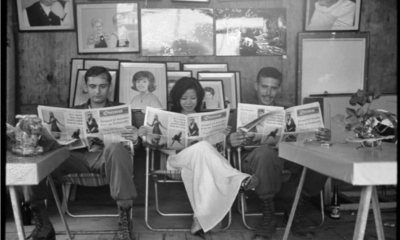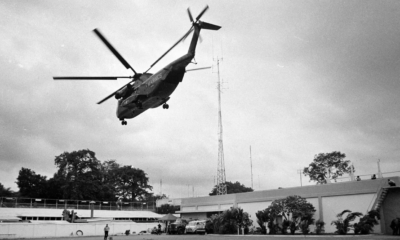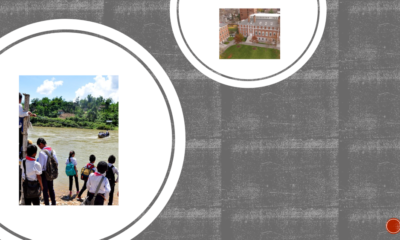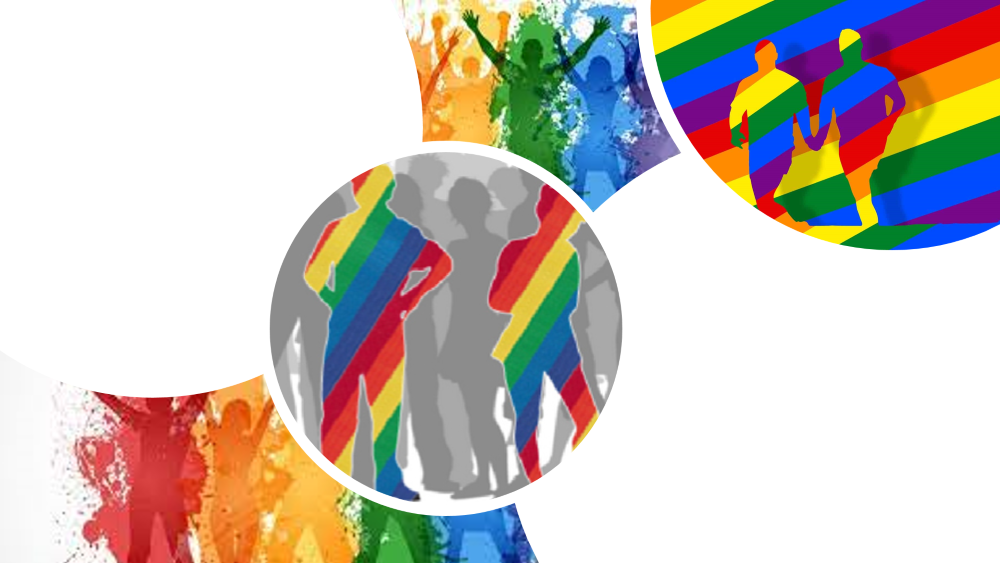Beyond Silence: Understanding Sexuality and Queerphobia in the Vietnamese American Community (Part 1, Part 2, Part 3)
By Anna Nguyen
Tell me a little bit about your career journey as a professor and any related work you do in that field.
I’m currently an assistant professor in Critical Race and Ethnic Studies at Augsburg University. My concentration is in Asian American and Southeast Asian American Studies. I do a little bit of work about queerness within the framework of critical refugee studies, just because I’m really interested in thinking through how queerness is not only a position or identity, but also a particular type of politics that intervenes materially into the way we understand different types of social relationships in the world.
I published an article about queer disinheritance that discusses a very simple idea: that there is a dissonance between what people in the US consider as queer politics versus how people think about refugee politics. These two fields don’t seem to have anything to do with one another, but only because they don’t think about each other. Queer people don’t think about refugees and refugees don’t think about queer people, to a certain extent. I think that’s one of the reasons why it’s important to talk about queerness in the way that you think it is.
I do know that there are lesbian, gay, and queer elders who got to the US and organized on their own. But their main goal was community building, just so they could live their life. For those elders, their queer identity is different from what it is to younger people, who are still more or less dependent on their family or have a formal adult relationship with their families. Those are all the things that come into contact on a material level.
In my article on queer refugee dis/inheritance, I was trying to dig deeper because in critical refugee studies, there’s a lot of discussion about intergenerational trauma. That leads to my work, which asks: what happened here? If your kids are queer and they left home, they are queer refugee descendants who are experiencing homophobia, transphobia, and abuse that stems from violence inflicted on their parents, like war trauma. So if that’s the case, when the family breaks, where does memory travel? When queerness intervenes into a family, how does it shape the relationship between parents and children? Are they just going to take it, because their parents are refugees? What is an ethic of remembrance when it comes to queer bodies and war trauma, both of which are very much inherited. Because every act of violence towards queer people is inherited. So what that article did was try to think conceptually and theoretically about how can we understand this very small and almost insignificant dynamic that still exists.
That’s a very layered and interesting relationship to conceptualize, particularly within the alienation you would feel as a queer person from both your family and your identity. These types of estrangement are different, but are still distinctly violent nonetheless. I also wanted to ask you about the challenges you have you faced as an openly queer person in the Vietnamese American community.
I was born and raised in Vietnam. I came here around 10 years ago, so in a way I’m exposed to the Vietnamese American community but they’re not exposed to me. Because I came here as an adult, the trajectory of my queerness is very much like, yes I’m queer, and that’s it. Professionally, people have to respect me. I wouldn’t say this is more positive, but I’m in academia so universities are spaces where if you belong to the right circle or if you have the right colleagues, their identities are all similar to yours. For example, when I went to grad school, I was taught by four women of color who are queer. That’s pretty rare for a lot of people. A lot of my friends in this particular field are queer, and all my activist friends, or the community members I talk to, are also queer. So in a way, I’m exposed to queer America of color. I’m exposed to queer Vietnamese America. In a way, these people are my community and I feel supported in that I don’t really have to talk about my queerness because we’re just living life and experiencing things with each other.
On the other hand, when it comes to my work with the Vietnamese community, that kind of work has nothing to do with the queer identity. You don’t necessarily have to disclose your queerness to do that work. But even if I don’t disclose this aspect of my identity, I still bring my queer self to the work because it shows up in the way I deal with questions and approach this kind of advocacy. For example, when neutral language—like “Vietnamese American youth”—is used, you assume you’re working with a straight person. You’re not really thinking about things that are non-normative. But when I think about youth, the queer and non-normative aspects of that need to be included in the description.
When I say I don’t talk about my identity but bring it to work, it means that I use my identity as a vehicle of knowledge. I understand that people like me exist, and so as a rule of thumb, I advocate for those people in their absence. And that’s the point of queer politics. You advocate for queer, trans, and non-binary people even in their absence.
That’s a good way of putting it, like you’re bringing your queerness into your work because it’s just another added layer of your identity. It’s not something you necessarily need to perform in a way. What intersections, if any, do you see between the queer and Vietnamese communities? You mentioned earlier about the distinction between the two, but I wanted to hear more about what kinds of spaces exist for queer Vietnamese Americans to explore the parameters of their identities.
The kind of queer spaces for Vietnamese American queer people, for me, exist in the claiming of radical queer politics that help us understand our path alongside but beyond the kind of politics that have been assigned to “Vietnamese American” collective identity or even “Asian American” collective identity. This includes migration history, refugeehood, assimilation, family formation, intergenerational conflicts, cultural essentialist notions of identities, et cetera. The kinds of spaces that exist for queer Vietnamese Americans will have to come from their own radical space-making, taking up space, becoming political, choosing their political genealogy.
The distinction I mentioned earlier between the queer and Vietnamese communities is not something for us to produce absolute knowledge about, but rather—at least for myself and a lot of folks who are similarly identified—an invitation to think about queerness as a particular type of politics that inherits radical history. Queer politics is not just about sexuality or sexual orientation. That’s part of an old discourse that came directly from the 1940s-50s where the main issues were around the dishonorable discharge of gay men from the military, the legal exclusion of gay marriage, and other anti-gay sentiments. Here, people just wanted to define their own sexual orientation to say that outside of that, they’re just like everyone else. But queer people are not just like straight people. The kind of queer politics I cultivate, along with my friends over the years, comes from abolitionism. It comes from anti-racist practices, from an understanding of colonialism and the ways in which the queer body is made non-normative. Queerness comes from colonialism, and from the construction of the non-white body, the non-able body, the monstrous body. Like it came from actual medical practices and scientific racism. The idea of non-normativity, non-straightness, also came from medical experiments on Black women specifically.
When you follow those kinds of genealogies, a lot of people can ask what does that have to do with me? You can think that it has nothing to do with you because if you think hard enough, nothing has anything to do with you. But also, if you think harder, everything has something to do with you. It really has in a historical sense. The historical occurrences of racism, homophobia, and transphobia dictate how the dominant society views certain bodies, in that they need to be fixed, converted, or cured. So with that understanding, I come to understand that if I am to claim queerness, I am to claim politics. I need to go against the things that constitute this queerness in the first place. I need to reject those values that have contributed to the hatred, indifference, apathy, and fear of queerness and the queer body. And that, for me, is queer politics. It’s not about fighting for the liberal notion of being equal with your oppressor. That’s just not how power works. Power only works with the oppressor and the oppressed when there’s the non-normative. When there’s the center and everyone else on the margin. So where queer politics is for me is to stabilize those loosely held notions of things like normativity.
With the kinds of relationships between queer politics and abolitionist, anti-racist, and decolonial work, how do you see that translating from theory into praxis?
It’s very simple. It’s understanding that queer people exist in all aspects of life and not only with the discussion of sexuality. It’s about understanding that a lot of the time, the only conversation around LGBTQ identity is about representation, the right to love, or integrating into a society that has previously excluded them. In a way, this is unwittingly pushing a narrative of conformity that limits where queer people exist. It makes it look like queer people only exist in the civil aspect of becoming accepted into society. But there are queer people in prison, there are queer people being deported. There are queer people literally everywhere, and those people are good people, right? So if you think about just that fact, then you understand that when you are doing anti-racist work, you are doing anti-racist work for queer people of color. When you’re doing abolitionist work, you are also doing abolitionist work for queer people currently in prison. So in that way, the answer is both simple and complicated to think about. That’s why queer politics is about community building. It is about being in community with people who are queer and who have this politics with a delineation of what it means. It’s about being with people who think about queerness theoretically, like if we are excluded, who else is excluded and by what logic? Once you start thinking about the similarities between the criminalization of people of color, queer people, and the intersection between the two through homelessness, it opens up a lot of vulnerability.
The way family is constructed in society keeps queer people from being able to consider themselves the protagonist of it. Queer kids always have to think about themselves as the queer person of this household. You never think about your family as queer, it’s always seen through the norm of straightness. Your parents are straight and now you’re queer, so you are the outsider in that construction of family. A straight family is not only reproducing citizens for the state, but also the right type of sexuality, body, and identity to be a part of that. The nuclear family is a particular invention for private property and is used for legal participation in the loosely held democratic nation state. There are all these different ways of understanding your identity in that once you move away, the framework of sexual orientation and personal choice cannot be understood as something that is biological. There are even more ways for people to frame personal identity as something uniquely private, and that goes back to the idea of the private, the public, and who has access to both.
I’m drawing a lot of parallels to the ways in which my parents, who are Vietnamese refugees, are navigating their assimilation into white and straight American political culture. That’s something they will strive to achieve but never entirely fit into because that’s just not who they are—they’re Vietnamese. Like kind of what you brought up in trying to achieve civil legal rights for queer people. You’re trying to conform to this society that isn’t really created to accommodate your needs. So, with this emergence of a new conception of queer politics and how we situate ourselves in relationship to other people and identities, do you think this attempt to assimilate will continue?
I think that this really depends on who you talk to and the ways they have been politicized to answer the question. Because yes, there are certain structures of oppression that have just been built into the system and the way people think of a natural social order. Immigrants and refugees who are framed legally, socially, politically, and culturally as victims of war take on this assimilationist framework that has been put in this country. This framework has already existed, and it is the underlying liberal notion of American democracy—that white men are at the top and everyone else is the “white man’s burden.” The white man has to liberate everybody and spread democracy to all the countries. They make sure everyone follows capitalism, the settler logic of private property, among other things. Assimilation has been well ingrained into American politics. At this point, they don’t use that word much but it exists as a feeling of entitlement. Like you’re in America, now so you need to speak English. It exists in the very colloquial kind of hateful remarks. If you don’t like America, you need to leave it. So assimilation has always been a part of American grammar when it comes to dealing with the other types of things in people’s lives.
You asked a question earlier about finding a space. I would say that you can just make space. You just really have to think for yourself and do what you want because a lot of the time, people just want to be accepted and fit into the norm. And that’s the private tragedy that we have, because sometimes we see people fighting for something that’s so futile. Queer politics is about how you position yourself with other people, how much you can rise above your immediate surroundings to look at the bigger picture. How much do you hold on to respectability politics because it serves you. Because you get rewarded when you perform in a certain way. My point is that there is something beyond queer personal politics, which is the particular ways in which non queer people treat you. That’s one part of the queer politics, and the other parts come from the social structures you are resisting against.
I think that gets into this really interesting phenomenon of false allyship and how a person actually engages in solidarity. There seems to be a tendency for white people or others in positions of power to perform allyship when it’s convenient for them. But because queer politics is situated in a very intimate relationship between all these kinds of revolutionary efforts, how do you see it developing and changing on a national or international scale? Because things like racism, sexism, and homophobia aren’t just specific to America even though those forces are really acute here.
What you’re saying is really relevant, and it’s a question I think about a lot. The domestic terrain of the United States gets messy when it comes to queer politics, but when you go international, it gets even messier. When it comes to international or transnational politics, there are folks who think about queerness as strictly about sexual acts or sexual orientation and then see that as having nothing to do with them when to go and travel and consume things. They don’t know how to act when they go overseas because they feel like they got rid of the legal constraint present in their home country and can now be on their worst behavior. This specifically refers to phenomena like gay sex tourism in the Global South and the exploitation of poor queer and trans people of color who are sex workers. So there’s that, but there’s also people in the diaspora—like queer people of color—that are weird iceberg subjects in relation to their homelands. They were queer there and are queer here, and have a particular transnational understanding and critique of whiteness. They hold an approach to queer politics that others might not be able to produce, because they don’t know what it’s like to be transnational, to be both here and there.
One thing about queer politics that I do know of is that people are excellent. They are everywhere, and draw many intimate critiques of imperialism and capitalism in the way that if you were in the center of the North American metropolis, you wouldn’t know it. You wouldn’t experience it because that’s just never going to come into your radar. But you can use this knowledge in a way that strengthens and expands your own queer politics. And that goes back into our conversation about what this queer space is in the Vietnamese American community. Is it universal, like every space is a queer space, or do the people actually have to create their own? Regardless of what the outside world is, queer people have to figure out a way to make their own chosen family, create their own subculture, and develop their own forms of entertainment. People think of queerness differently, and people think about what they can do as a queer person to their own community differently.

 Politics & Economy4 years ago
Politics & Economy4 years ago
 Politics & Economy1 year ago
Politics & Economy1 year ago
 Society & Culture5 years ago
Society & Culture5 years ago
 ARCHIVES5 years ago
ARCHIVES5 years ago
 Politics & Economy4 years ago
Politics & Economy4 years ago
 After 19751 year ago
After 19751 year ago
 Politics & Economy5 years ago
Politics & Economy5 years ago
 Politics & Economy4 years ago
Politics & Economy4 years ago







